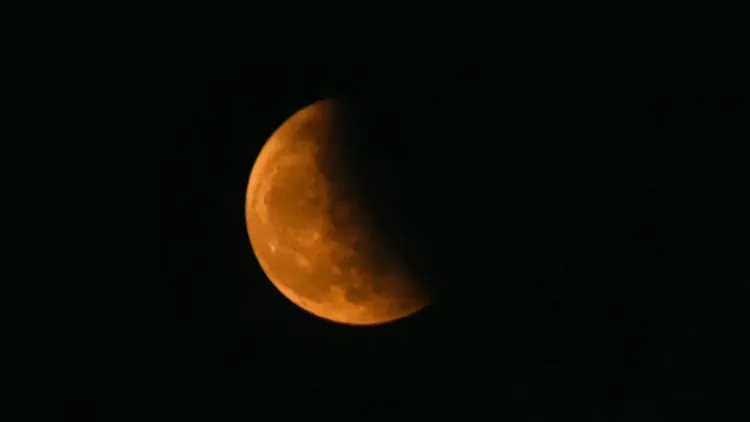Worm Moon Lunar Eclipse 2024: How to Catch the Celestial Show
view the enchanting worm moon lunar eclipse in March 2024, a natural spectacle lighting up the night sky

-
Introduction
- Brief overview of the worm moon and its significance
- What makes the 2024 penumbral lunar eclipse special
-
Understanding the Worm Moon
- Origin of the "worm moon" name
- The connection to the spring equinox
-
The Penumbral Lunar Eclipse Explained
- What is a penumbral lunar eclipse?
- How it differs from partial and total lunar eclipses
-
Viewing the 2024 Worm Moon Eclipse
- Best times and locations for viewing
- Tips for a clearer view of the subtle changes in the moon’s appearance
-
The Science Behind Lunar Eclipses
- The alignment of the sun, Earth, and moon
- Why eclipses don't occur every month
-
Eclipse Season and Its Celestial Significance
- The phenomenon of eclipse season
- Upcoming lunar and solar eclipses in 2024
-
Safe Viewing Practices
- How to safely observe lunar eclipses
- Differences in viewing requirements between lunar and solar eclipses
-
FAQs
- Common questions about viewing lunar eclipses
-
Conclusion
- Encouragement to explore the night sky
- Promoting further engagement with celestial events
-
Further Resources
- Links to additional information on celestial observations and events
The Spectacle of the Worm Moon Lunar Eclipse
The night sky in March 2024 will be graced with the mesmerizing sight of the worm moon, accompanied by a penumbral lunar eclipse. This natural phenomenon, where the moon passes through the Earth's outer shadow, promises a subtle yet captivating celestial display. The term "worm moon," originating from Native American tribes, reflects the season's thawing ground and the emergence of earthworms, signaling the return of spring.
Viewing Guide and Timings
For enthusiasts eager to witness this event, the eclipse will commence in the early hours at 12:53 a.m. ET, with the greatest eclipse expected at 3:12 a.m. ET. Observers across various parts of the globe, including Europe, Asia, Australia, Africa, and the Americas, will have the privilege of witnessing this event, weather permitting.
Understanding the Phenomenon
A penumbral lunar eclipse is less dramatic than its total or partial counterparts but fascinating nonetheless. The moon's subtle darkening, caused by the Earth's penumbral shadow, creates a gradient effect across its surface—a spectacle best observed with the naked eye under clear sky conditions.
Eclipses: Celestial Rhythms
Lunar and solar eclipses come in pairs, tied to the celestial rhythm of the sun, Earth, and moon's alignments. This upcoming lunar eclipse precedes a total solar eclipse, underscoring the interconnected nature of these celestial events. Additionally, 2024 will witness another annular solar eclipse and a partial lunar eclipse, offering multiple opportunities for celestial observation.
Safe Viewing Tips
Viewing a lunar eclipse requires no special equipment, unlike its solar counterpart. Observers are encouraged to find a spot with a clear view of the moon during the event times. These natural spectacles offer a moment to reflect on our place in the universe and the wonders it holds.
Embracing the Celestial Show
The worm moon lunar eclipse serves as a reminder of the ever-changing beauty of the night sky. Whether you're an avid astronomer or a casual stargazer, this event offers a unique opportunity to connect with the cosmos. For those keen to delve deeper into celestial phenomena, various resources and communities are available to explore.
Engage Further with the Cosmos
As we anticipate the worm moon lunar eclipse, let's embrace the opportunity to engage with the night sky. This event is a gateway to appreciating the broader tapestry of celestial events that enrich our lives. For more insights into upcoming eclipses and astronomical wonders, consider exploring additional resources and joining community observations to share in the awe of the universe's beauty.
FAQs
- What is the best way to view the worm moon lunar eclipse?
- Why is it called a "worm moon"?
- Can lunar eclipses occur more than once a year?
- What makes a penumbral eclipse different from other types of lunar eclipses?
By fostering an appreciation for celestial events like the worm moon lunar eclipse, we deepen our connection to the natural world and the cosmos beyond. This 2024 spectacle invites us to look up and marvel at the universe's wonders, a reminder of the beauty that surrounds us, waiting to be discovered.
What's Your Reaction?





















